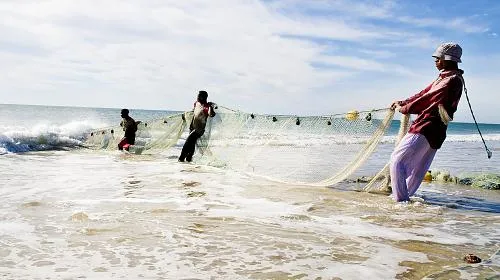Africa’s largest coastal marine reserve is established
WASHINGTON, D.C. (November 19, 2012) – The Government of Mozambique today announced the creation of an environmental protection area in Africa, in an area where CARE is working with World Wildlife Fund to give people alternatives for generating income and feeding their families.
Made up of ten islands off the coast of northern Mozambique, this protected area in the Primeiras and Segundas Archipelago will cover more than 4,020 square miles and contains abundant coral and turtle species. WWF has worked for eight years to secure the reserve located in between Nampula and Zambezia Provinces.
Home to five of the world’s seven marine turtle species, it is a key breeding site for dugong, seabirds and marine turtles. The region also offers abundant coral and fish.
The conservation organization also has joined with CARE – as part of the CARE-WWF Alliance – to introduce new conservation agriculture techniques that increase productivity for people living in the coastal area. Many of them live on less than $1 a day.
The abilities of people and nature to thrive are inextricably linked. Yet, for the women, men and children who rely on natural resources to meet their basic needs, growing competition for resources, combined with our changing climate, only intensifies the challenges they face each and every day.
This is especially true for marginalized women and girls, who tend to be the most vulnerable members of poor communities. The Alliance has helped organize community associations and village savings and loans to expand markets and income from fishing and agricultural activities.
Resources and Communities
The Archipelago is filled with natural resources, including the most robust and diverse coral community in Mozambique, if not in Africa. It is rich in mangroves, biologically diverse marine life, deep underwater canyons and large seagrass beds.
Due to cold nutrient-rich upwellings, the Archipelago is spared from coral bleaching — a common problem in other coral-rich areas — making these some of the most globally productive and important reefs for the planet’s future.
The declaration of the environmental protection area will provide protection for the coral that serve as hatcheries for many species of fish. Many people in the community depend heavily on the fish for food and nutrition. More than half the population now lives in extreme poverty and is often unable to get access to food due to erosion, deforestation, periods of drought and soil infertility.
Additionally, the rich marine resources of the Archipelago have been overexploited by illegal industrial fishing fleets. Unauthorized tourism operations in many of the islands have caused significant ecological damage.
If both the terrestrial and marine resources in this area are managed in a sustainable way, they could provide the local population with food, income and employment for generations to come. The new marine reserve will help Mozambican communities and government in realizing this promise.
How WWF Helps
The Coastal Communities initiative of the CARE-WWF Alliance works with communities and partners at the local, national and regional level to secure a healthy marine ecosystem along the coast of East Africa.
We have engaged with more than 10,000 coastal households since 2008, and results so far include:
- Developing marine sanctuaries to facilitate rebounding fish stocks
- Introducing new conservation agriculture techniques to increase productivity and ecosystem services
- Organizing community associations and village savings and loans to expand markets and income from fishing and agricultural activities
And this Coastal Communities initiative is just the beginning. The Alliance represents a 10-year commitment to realizing community-based natural resource management on a scale never before achieved.
The aim is to not only protect marine areas but sustainably manage the natural resources for the benefit and enhanced livelihoods of local coastal communities.
Learn more about our work in this region by reading Giving Sea Turtles a Fighting Chance.
Media Contacts:
Atlanta: Brian Feagans, CARE, bfeagans@care.org, +1.404.979.9453, +1.404.457.4644
Washington: Stephanie Chen, CARE, schen@care.org, +1.202.595.2824

